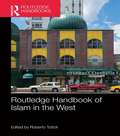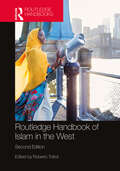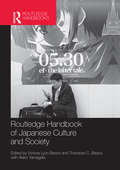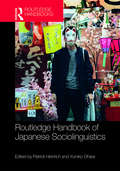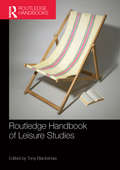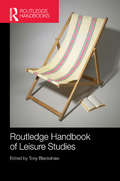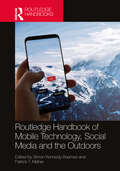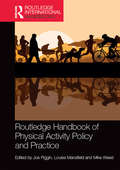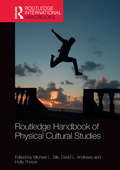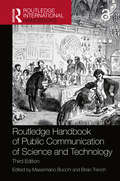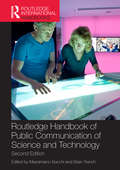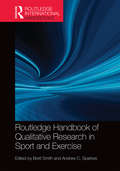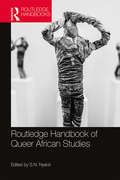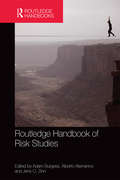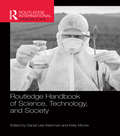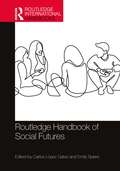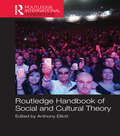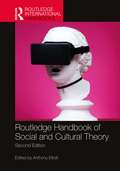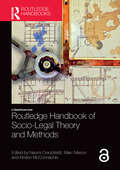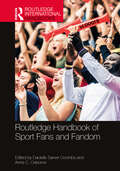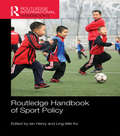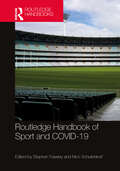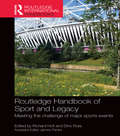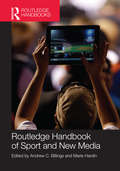- Table View
- List View
Routledge Handbook of Islam in the West
by Roberto TottoliIslam has long been a part of the West in terms of religion, culture, politics and society. Discussing this interaction from al-Andalus to the present, this Handbook explores the influence Islam has had, and continues to exert; particularly its impact on host societies, culture and politics. Highlighting specific themes and topics in history and culture, chapters cover: European paradigms Muslims in the Americas Cultural interactions Islamic cultural contributions to the Western world Western contributions to Islam Providing a sound historical background, from which a nuanced overview of Islam and Western society can be built, the Routledge Handbook of Islam in the West brings to the fore specific themes and topics that have generated both reciprocal influence, and conflict. Presenting readers with a range of perspectives from scholars based in Europe, the US, and the Middle East, this Handbook challenges perceptions on both western and Muslim sides and will be an invaluable resource for policymakers and academics with an interest in the History of Islam, Religion and the contemporary relationship between Islam and the West.
Routledge Handbook of Islam in the West
by Roberto TottoliWith new topics and contributions, this updated second edition discusses the history and contemporary presence of Islam in Europe and America. The book debates the relevance and multi-faceted participation of Muslims in the dynamics of Western societies, challenging the changing perception on both sides. Collating over 30 chapters, written by experts from around the world, the volume presents a wide range of perspectives. Case studies from the Muslim presence in the Iberian Peninsula between the Middle Ages and the modern age set off the Handbook, along with an outline of Muslims in America up to the twentieth century. The second part covers concepts around new conditions in terms of consolidating identities, the emergence of new Muslim actors, the appearance of institutions and institutional attitudes, the effects of Islamic presence on the arts and landscapes of the West, and the relational dynamics like ethics and gender. Exploring the influence of Islam, particularly its impact on society, culture and politics, this interdisciplinary volume is a key resource for policymakers, academics and students interested in the history of Islam, religion and the contemporary relationship between Islam and the West.
Routledge Handbook of Japanese Culture and Society
by Theodore C. Bestor Edited by Victoria Lyon Bestor Akiko YamagataThe Routledge Handbook of Japanese Culture and Society is an interdisciplinary resource that focuses on contemporary Japan and the social and cultural trends that are important at the beginning of the twenty-first century. This Handbook provides a cutting-edge and comprehensive survey of significant phenomena, institutions, and directions in Japan today, on issues ranging from gender and family, the environment, race and ethnicity, and urban life, to popular culture and electronic media. Written by an international team of Japan experts, the chapters included in the volume form an accessible and fascinating insight into Japanese culture and society. As such, the Handbook will be an invaluable reference tool for anyone interested in all things Japanese. Students, teachers and professionals alike will benefit from the broad ranging discussions, useful links to online resources and suggested reading lists. The Handbook will be of interest across a wide range of disciplines including Japanese Studies, Cultural Studies, Anthropology, Sociology and Asian Studies in general.
Routledge Handbook of Japanese Sociolinguistics
by Patrick Heinrich Yumiko OharaPresenting new approaches and results previously inaccessible in English, the Routledge Handbook of Japanese Sociolinguistics provides an insight into the language and society of contemporary Japan from a fresh perspective. While it was once believed that Japan was a linguistically homogenous country, research over the past two decades has shown Japan to be a multilingual and sociolinguistically diversifying country. Building on this approach, the contributors to this handbook take this further, combining Japanese and western approaches alike and producing research which is relevant to twenty-first century societies. Organised into five parts, the sections covered include: The languages and language varieties of Japan. The multilingual ecology. Variation, style and interaction. Language problems and language planning. Research overviews. With contributions from across the field of Japanese sociolinguistics, this handbook will prove very useful for students and scholars of Japanese Studies, as well as sociolinguists more generally.
Routledge Handbook of Leisure Studies (Routledge International Handbooks Ser.)
by Tony BlackshawThis landmark publication brings together some of the most perceptive commentators of the present moment to explore core ideas and cutting edge developments in the field of Leisure Studies. It offers important new insights into the dynamics of the transformation of leisure in contemporary societies, tracing the emergent issues at stake in the discipline and examining Leisure Studies’ fundamental connections with cognate disciplines such as Sociology, Cultural Studies, History, Sport Studies and Tourism. This book contains original work from key scholars across the globe, including those working outside the Leisure Studies mainstream. It showcases the state of the art of contemporary Leisure Studies, covering key topics and key thinkers from the psychology of leisure to leisure policy, from Bourdieu to Baudrillard, and suggests that leisure in the 21st century should be understood as centring on a new ‘Big Seven’ (holidays, drink, drugs, sex, gambling, TV and shopping). No other book has gone as far in redefining the identity of the discipline of Leisure Studies, or in suggesting how the substantive ideas of Leisure Studies need to be rethought. The Routledge Handbook of Leisure Studies should therefore be the intellectual guide of first choice for all scholars, academics, researchers and students working in this subject area.
Routledge Handbook of Leisure Studies (Routledge International Handbooks Ser.)
by Tony BlackshawThis landmark publication brings together some of the most perceptive commentators of the present moment to explore core ideas and cutting edge developments in the field of Leisure Studies. It offers important new insights into the dynamics of the transformation of leisure in contemporary societies, tracing the emergent issues at stake in the discipline and examining Leisure Studies’ fundamental connections with cognate disciplines such as Sociology, Cultural Studies, History, Sport Studies and Tourism. This book contains original work from key scholars across the globe, including those working outside the Leisure Studies mainstream. It showcases the state of the art of contemporary Leisure Studies, covering key topics and key thinkers from the psychology of leisure to leisure policy, from Bourdieu to Baudrillard, and suggests that leisure in the 21st century should be understood as centring on a new ‘Big Seven’ (holidays, drink, drugs, sex, gambling, TV and shopping). No other book has gone as far in redefining the identity of the discipline of Leisure Studies, or in suggesting how the substantive ideas of Leisure Studies need to be rethought. The Routledge Handbook of Leisure Studies should therefore be the intellectual guide of first choice for all scholars, academics, researchers and students working in this subject area.
Routledge Handbook of Mobile Technology, Social Media and the Outdoors (Routledge Advances in Outdoor Studies)
by Patrick T. Maher Simon Kennedy BeamesThis is the first book to explore the numerous ways in which mobile technologies and social media are influencing our outdoor experiences.Across the fields of outdoor education, outdoor recreation and leisure, and nature-based tourism, the book considers how practices within each of those domains are being influenced by dramatically shifting interactions between technology, humans, the natural world, and wider society. Drawing on cutting-edge research by leading scholars from around the world and exploring key concepts and theory, as well as developments in professional practice, the book explains how digital technology and media are no longer separate from typical human and social activity. Instead, the broader field of outdoor studies can be viewed as a world of intertwined socio-technical assemblages that need to be understood in more diverse ways. The book offers a full-spectrum view of this profound shift in our engagement with the world around us by presenting new work on subjects including networked spaces in residential outdoor education, digital competencies for outdoor educators, the use of social media in climbing communities, and the impact of digital technologies on experiences of adventure tourism.This is essential reading for anybody with an interest in outdoor studies, outdoor education, adventure education, leisure studies, tourism, environmental studies, environmental education, or science, technology, and society studies.
Routledge Handbook of Physical Activity Policy and Practice (Routledge International Handbooks)
by Louise Mansfield Mike Weed Joe PigginPhysical activity, inactivity and their relationship to health are serious concerns for governments around the world. This is the first book to critically examine the policy and practice of physical activity from a multi-disciplinary, social-scientific perspective. Moving beyond the usual biophysical and epidemiological approaches, it defines and explores the key themes that are shaping the global physical activity debate. Unrivalled in its scale and scope, it presents the latest data on physical activity from around the world, including case studies from Europe, North and South America, Africa and Asia. Drawing on social, economic and behavioural sciences, it covers contexts from the global to the local and introduces the dominant ideas which inform the study of physical activity. Its 41 chapters examine the use of different forms of evidence in policymaking, the role of organisations in advocating physical activity, and the practical realities of public health interventions. The Routledge Handbook of Physical Activity Policy and Practice is a landmark publication for all students, academics, policymakers and practitioners interested in the social-scientific study of sport, exercise, physical activity and public health.
Routledge Handbook of Physical Cultural Studies (Routledge International Handbooks)
by David L. Andrews Holly Thorpe Michael L. SilkPhysical cultural studies (PCS) is a dynamic and rapidly developing field of study. This handbook offers the first definitive account of the state of the art in PCS, showcasing the latest research and methodological approaches. It examines the boundaries, preoccupations, theories and politics of PCS, drawing on transdisciplinary expertise from areas as diverse as sport studies, sociology, history, cultural studies, performance studies and anthropology. Featuring chapters written by world-leading scholars, this handbook examines the most important themes and issues within PCS, exploring the active body through the lens of class, age, gender, sexuality, race, ethnicity, (dis)ability, medicine, religion, space and culture. Each chapter provides an overview of the state of knowledge in a particular subject area, while also considering possibilities for developing future research. Representing a landmark contribution to physical cultural studies and allied fields, the Routledge Handbook of Physical Cultural Studies is an essential text for any undergraduate or postgraduate course on physical culture, sports studies, leisure studies, the sociology of sport, the body, or sport and social theory.
Routledge Handbook of Public Communication of Science and Technology: Second Edition (Routledge International Handbooks)
by Massimiano BucchiCommunicating science and technology is a high priority of many research and policy institutions, a concern of many other private and public bodies, and an established subject of training and education. In the past few decades, the field has developed and expanded significantly, both in terms of professional practice, and in terms of research and reflection. At the same time, particularly in recent years, interactions between science and society have become a topic of heated public and political debates, touching issues like quality and credibility of information, trust in science and scientific actors and institutions and the roles of experts in crises and emergencies. This book provides a state-of-the-art review of this fast-growing and increasingly important area, through an examination of research done on the main actors, issues and arenas involved. The third edition of the Handbook brings the reviews up-to-date and deepens the analysis. As well as substantial re-working of many chapters, it includes four new chapters addressing enduring themes (science publics, science-media theories), recent trends (art-science interactions) and new proposed insights on science communication as culture and as 'the social conversation around science'. New contributors are added to the group of leading scholars in the field featured in the previous editions. The Handbook is a student-friendly resource, but its scope and expert contributions will equally appeal to practitioners and professionals in science communication. Combining the perspectives of different disciplines and of different geographical and cultural contexts, this original text provides an interdisciplinary as well as a global approach to public communication of science and technology. It is a valuable resource, notably an indispensable guide to the published work in the field, for students, researchers, educators and professionals in science communication, media and journalism studies, sociology, history of science, and science and technology studies.
Routledge Handbook of Public Communication of Science and Technology: Second edition (Routledge International Handbooks #28)
by Massimiano Bucchi Brian TrenchCommunicating science and technology is a high priority of many research and policy institutions, a concern of many other private and public bodies, and an established subject of training and education. Over the past few decades, the field has developed and expanded significantly, both in terms of professional practice and in terms of research and reflection. The Routledge Handbook of Public Communication of Science and Technology provides a state-of-the-art review of this fast-growing and increasingly important area, through an examination of the research on the main actors, issues, and arenas involved. In this brand-new revised edition, the book brings the reviews up-to-date and deepens the analysis. As well as substantial reworking of many chapters, it gives more attention to digital media and the global aspects of science communication, with the inclusion of four new chapters. Several new contributors are added to leading mass-communication scholars, sociologists, public-relations practitioners, science writers, and others featured herein. With key questions for further discussion highlighted in each chapter, the handbook is a student-friendly resource and its scope and expert contributors mean it is also ideal for both practitioners and professionals working in the field. Combining the perspectives of different disciplines and of different geographical and cultural contexts, this original text provides an interdisciplinary and global approach to the public communication of science and technology. It is a valuable resource for students, researchers, educators, and professionals in media and journalism, sociology, the history of science, and science and technology.
Routledge Handbook of Qualitative Research in Sport and Exercise (Routledge International Handbooks)
by Andrew C. Sparkes Brett SmithThe last two decades have witnessed a proliferation of qualitative research in sport and exercise. The Routledge Handbook of Qualitative Research in Sport and Exercise is the first book to offer an in-depth survey of established and emerging qualitative methods, from conceptual first principles to practice and process. Written and edited by a team of world-leading researchers, and some of the best emerging talents, the book introduces a range of research traditions within which qualitative researchers work. It explores the different methods used to collect and analyse data, offering rationales for why each method might be chosen and guidance on how to employ each technique successfully. It also introduces important contemporary debates and goes further than any other book in exploring new methods, concepts, and future directions, such as sensory research, digital research, visual methods, and how qualitative research can generate impact. Cutting-edge, timely and comprehensive, the Routledge Handbook of Qualitative Research in Sport and Exercise is an essential reference for any student or scholar using qualitative methods in sport and exercise-related research.
Routledge Handbook of Queer African Studies
by S. N. NyeckThis handbook offers diverse perspectives on queer Africa, incorporating scholarly contributions on themes that reflect and inflect the trajectories of queer contributions to African studies within and outside academia. The Routledge Handbook of Queer African Studies incorporates a range of unique perspectives, reflecting ongoing struggles between regimes of inclusion and those of transformation premised upon different relational and reflexive engagements between queer embodiment and Africa’s subjectivities. All sections of this handbook blend contributions from public intellectuals and practitioners with academic reflections on topics not limited to neoliberalism, social care, morality and ethics, social education, and technology, through the lens of queer African studies. The book renders visible the ongoing transformations and resistance within African societies as well as the inventiveness of queer presence in negotiating belonging. This handbook will be of interest to students and scholars of gender and sexuality in Africa, queer studies, and African culture and society.
Routledge Handbook of Risk Studies (Routledge International Handbooks)
by Alberto Alemanno Jens Zinn Adam BurgessIt is over 40 years since we began to reflect upon risk in a more social than technological and economic fashion, firstly making sense of the gap between expert and public assessment of risks, such as to our health and environment. With fixed certainties of the past eroded and the technological leaps of ‘big data’, ours is truly an age of risk, uncertainty and probability - from Google’s algorithms to the daily management of personal lifestyle risks. Academic reflection and research has kept pace with these dizzying developments but remains an intellectually fragmented field, shaped by professional imperatives and disciplinary boundaries, from risk analysis to regulation and social research. This is the first attempt to draw together and define risk studies, through a definitive collection written by the leading scholars in the field. It will be an indispensable resource for the many scholars, students and professionals engaging with risk but lacking a resource to draw it all together.
Routledge Handbook of Science, Technology, and Society (Routledge International Handbooks)
by Kelly Moore Daniel Lee KleinmanOver the last decade or so, the field of science and technology studies (STS) has become an intellectually dynamic interdisciplinary arena. Concepts, methods, and theoretical perspectives are being drawn both from long-established and relatively young disciplines. From its origins in philosophical and political debates about the creation and use of scientific knowledge, STS has become a wide and deep space for the consideration of the place of science and technology in the world, past and present. The Routledge Handbook of Science, Technology and Society seeks to capture the dynamism and breadth of the field by presenting work that pushes the reader to think about science and technology and their intersections with social life in new ways. The interdisciplinary contributions by international experts in this handbook are organized around six topic areas: embodiment consuming technoscience digitization environments science as work rules and standards This volume highlights a range of theoretical and empirical approaches to some of the persistent – and new – questions in the field. It will be useful for students and scholars throughout the social sciences and humanities, including in science and technology studies, history, geography, critical race studies, sociology, communications, women’s and gender studies, anthropology, and political science.
Routledge Handbook of Social Futures (Routledge International Handbooks)
by Carlos López GalvizFeaturing chapters from an international range of leading and emerging scholars, this Handbook provides a collection of cutting-edge, interdisciplinary research that sheds new light on contemporary futures studies. Engaging with key defining questions of the early twenty-first century such as climate change, big data, AI, the future of economics, education, mental health, cities and more, the Handbook provides a review and synthesis of futures scholarship, highlighting the role that societies can and should play in their making. While the various chapters demonstrate how futures emerge and take shape in particular places at particular times, the distinctive insight provided by the volume overall is that futures thinking today must be social and contextual. By presenting a range of futures work from contexts around the globe, the Handbook contextualizes techniques – forecasting, backcasting, scenario planning, collaboration and co-production– to ask how different dimensions of the social are created and circulated in the process. Through its thirty chapters, the volume explores and interrogates narratives, anticipations, enactments, ecologies, collaborations, prospections and so on to highlight which versions of the social are legitimized and which are encouraged and foreclosed. This Handbook opens an important conversation about the centrality of the social in futures thinking. By bringing arts, humanities and social sciences scholars and practitioners into conversation with biologists, environmental, climate and computer scientists, this volume seeks to encourage new pathways across, between and within multiple disciplines to interrogate the futures we need and want. The social must be our starting point if we are to steer our planet in a direction that supports good lives for the many, everywhere.
Routledge Handbook of Social and Cultural Theory (Routledge International Handbooks)
by Anthony ElliottIf today students of social theory read Jurgen Habermas, Michel Foucault and Anthony Giddens, then proper regard to the question of culture means that they should also read Raymond Williams, Stuart Hall and Slavoj Zizek. The Routledge Handbook of Social and Cultural Theory offers a concise, comprehensive overview of the convergences and divergences of social and cultural theory, and in so doing offers a novel agenda for social and cultural research in the twenty-first century. This Handbook, edited by Anthony Elliott, develops a powerful argument for bringing together social and cultural theory more systematically than ever before. Key social and cultural theories, ranging from classical approaches to postmodern, psychoanalytic and post-feminist approaches, are drawn together and critically appraised. There are substantive chapters looking at – among others – structuralism and post-structuralism, critical theory, network analysis, feminist cultural thought, cultural theory and cultural sociology. Throughout the Handbook there is a strong emphasis on interdisciplinarity, with chapters drawing from research in sociology, cultural studies, psychology, politics, anthropology, women’s studies, literature and history. Written in a clear and direct style, this Handbook will appeal to a wide undergraduate and postgraduate audience across the social sciences and humanities.
Routledge Handbook of Social and Cultural Theory: 2nd Edition (Routledge International Handbooks)
by Anthony ElliottIf today students of social theory read Jurgen Habermas, Michael Foucault and Anthony Giddens, then proper regard to the question of culture means that they should also read Raymond Williams, Julia Kristeva and Slavoj Zizek. The second edition of the Routledge Handbook of Social and Cultural Theory is fully revised and updated to provide students, teachers and researchers with a comprehensive, critical guide to the major traditions of thought in social and cultural theory, as well as tracing the complex intellectual connections between these distinct but related approaches to understanding society and culture. The Handbook, edited by acclaimed sociologist Anthony Elliott, develops a powerful argument for bringing together social and cultural theory more systematically than ever before. Key social and cultural theories, ranging from classical approaches to postmodern, psychoanalytic and post-feminist approaches, are drawn together and critically appraised. There are also new chapters on mobilities and migrations, as well as posthumanism. The Handbook, written in a clear and direct style will appeal to a wide audience of students and scholars. The extensive references and sources will direct students to areas of further study.
Routledge Handbook of Socio-Legal Theory and Methods
by Naomi Creutzfeldt Kirsten McConnachie Marc MasonDrawing on a range of approaches from the social sciences and humanities, this handbook explores theoretical and empirical perspectives that address the articulation of law in society, and the social character of the rule of law.The vast field of socio-legal studies provides multiple lenses through which law can be considered. Rather than seeking to define the field of socio-legal studies, this book takes up the experiences of researchers within the field. First-hand accounts of socio-legal research projects allow the reader to engage with diverse theoretical and methodological approaches within this fluid interdisciplinary area. The book provides a rich resource for those interested in deepening their understanding of the variety of theories and methods available when law is studied in its broadest social context, as well as setting those within the history of the socio-legal movement. The chapters consider multiple disciplinary lenses – including feminism, anthropology and sociology – as well as a variety of methodologies, including: narrative, visual and spatial, psychological, economic and epidemiological approaches. Moreover, these are applied in a range of substantive contexts such as online hate speech, environmental law, biotechnology, research in post-conflict situations, race and LGBT+ lawyers.The handbook brings together younger contributors and some of the best-known names in the socio-legal field. It offers a fresh perspective on the past, present and future of sociolegal studies that will appeal to students and scholars with relevant interests in a range of subjects, including law, sociology and politics.Chapter 7 of this book is freely available as a downloadable Open Access PDF at http://www.taylorfrancis.com under a Creative Commons Attribution-Non Commercial-No Derivatives (CC-BY-NC-ND) 4.0 license.
Routledge Handbook of Socio-Legal Theory and Methods
by Naomi Creutzfeldt; Marc Mason; Kirsten McConnachieDrawing on a range of approaches from the social sciences and humanities, this handbook explores theoretical and empirical perspectives that address the articulation of law in society, and the social character of the rule of law. The vast field of socio-legal studies provides multiple lenses through which law can be considered. Rather than seeking to define the field of socio-legal studies, this book takes up the experiences of researchers within the field. First-hand accounts of socio-legal research projects allow the reader to engage with diverse theoretical and methodological approaches within this fluid interdisciplinary area. The book provides a rich resource for those interested in deepening their understanding of the variety of theories and methods available when law is studied in its broadest social context, as well as setting those within the history of the socio-legal movement. The chapters consider multiple disciplinary lenses – including feminism, anthropology and sociology – as well as a variety of methodologies, including: narrative, visual and spatial, psychological, economic and epidemiological approaches. Moreover, these are applied in a range of substantive contexts such as online hate speech, environmental law, biotechnology, research in post-conflict situations, race and LGBT+ lawyers. The handbook brings together younger contributors and some of the best-known names in the socio-legal field. It offers a fresh perspective on the past, present and future of sociolegal studies that will appeal to students and scholars with relevant interests in a range of subjects, including law, sociology and politics.
Routledge Handbook of Sport Fans and Fandom (Routledge International Handbooks)
by Danielle Sarver CoombsThis is the first book to explore the full significance of sport fans and fandom from an international and interdisciplinary perspective, across different sports, communities and levels of engagement. It gives a comprehensive overview of the undeniable economic and cultural influence of sport industries for which fans are the driving force. The book examines different theoretical and methodological approaches to the study of fans, including typologies of fandom, and presents cutting-edge discussion across broad thematic areas such as performance and identity, the business of fandom, and fandom and media. It considers the experiences of diverse and marginalized fan groups, with an emphasis on intersectional analysis, and shines new light on key contemporary themes such as fan activism, violence and deviance, mobility and migration, and the transformative effects of digital and social media. This volume includes chapters by many of the leading scholars responsible for having laid the foundation for sport fan research as well as early-career scholars who examine the newest developments in media technologies, legalized betting, gaming, and fantasy sports. Including perspectives from disciplines such as philosophy, sociology, psychology, management, economics, and media studies, this book is essential reading for anybody interested in the study of sport and wider society or fans and subcultures more broadly.
Routledge Handbook of Sport Policy (Routledge International Handbooks)
by Ian Henry Ling-Mei KoIt is difficult to fully understand the role that sport plays in contemporary global society without understanding how and why governments, NGOs and other organizations formulate and implement policy relating to sport. The Routledge Handbook of Sport Policy is the only book to offer a comprehensive overview of current perspectives, techniques and approaches to the analysis of sport policy around the world. The book introduces a diverse range of approaches to policy analysis across the full range of political and societal contexts, including developed and developing economies; state-centric, mixed economy and market-led systems, and both liberal democracies and political systems characterized by a dominant elite. It is arranged into five sections addressing the key topics and themes in the analysis of contemporary sport policy, including: theory and its implications for methodology globalization, governance, partnerships and networks elite sport policy development, sport and joint policy agendas sport policy and social theory. With contributions from leading policy analysts around the world, including Europe, North America, the Middle East and Asia, this book is important reading for any student, researcher or professional working in sport management, sport development, sport and society, or mainstream public policy, policy analysis or social policy.
Routledge Handbook of Sport and COVID-19 (Routledge International Handbooks)
by Stephen Frawley and Nico SchulenkorfThis book examines the initial impact of the coronavirus pandemic on global sport and the varying consequences of the sport shutdown on all levels of society. It also considers the many lessons that have been learnt so that sport stakeholders can successfully adjust and operate under the "new normal." Featuring authors, cases and examples from around the world, the book explores the impact of COVID-19 on sport at all levels, from community sport – where local clubs, gyms and development programmes had to find ways to survive with pitches closed and projects cancelled – to the major professional sport leagues and sport mega-events, with events postponed and teams playing in empty stadia. It considers the economic, social and developmental impacts of the pandemic, including physical, mental and social wellbeing, and looks at how key professional and community sport organizations have reacted to the crisis, reflecting on the lessons learnt and preparations for future pandemics and challenges of similar size and significance. With COVID-19 now endemic in the global population, this is an essential reference for anybody working in sport, from students and researchers to managers, policymakers and development officers.
Routledge Handbook of Sport and Legacy: Meeting the Challenge of Major Sports Events (Routledge International Handbooks)
by Dino Ruta Richard HoltWhat remains of a great sporting spectacle after the last race is run or the final match is played? How can the vast expense of mounting such events be justified? What if there is nothing left behind or what if the legacy is negative, a costly infrastructure which is unused or a debt-ridden host city? The Routledge Handbook of Sport and Legacy addresses perhaps the most important issue in the hosting of major contemporary sporting events: the problem of ‘legacy’. It offers a rigorous, innovative and comparative insight into this contested concept from interdisciplinary and practical perspectives. Major events must now have a conscious, credible and defined policy for legacy to meet public expectations. The book provides a comprehensive survey of the various kinds of legacy that can be delivered, as well as a close examination of the potential benefits and practical challenges involved in each. From ‘hard’ legacies, such as stadia and infrastructure, to ‘soft’ legacies including skill development, attitude change and capacity building, the book offers both a historical case study and an innovative strategic management approach, and establishes the limits of what can realistically be achieved in terms of economic, social, cultural, physical and sporting development. The Routledge Handbook of Sport and Legacy includes contributions from world leading scholars and practitioners and features detailed case studies of major sports events from around the world, including the FIFA World Cup and ten Olympics Games from London in 1908 to London 2012. It is invaluable reading for students and researchers working in sport studies, events management, human geography, economics or planning, and an essential reference for any professional engaged in delivering legacy through sport.
Routledge Handbook of Sport and New Media: Routledge Handbook Of Sport And New Media (Routledge International Handbooks)
by Andrew C. Billings Marie Hardin Natalie A. BrownNew media technologies have become a central part of the sports media landscape. Sports fans use new media to watch games, discuss sports transactions, form fan-based communities, and secure minutiae about their favorite players and teams. Never before have fans known so much about athletes, whether that happens via Twitter feeds, fan sites, or blogs, and never before have the lines between producer, consumer, enactor, fan and athlete been more blurred. The Internet has made virtually everything available for sports media consumption; it has also made understanding sports media substantially more complex. The Routledge Handbook of Sport and New Media is the most comprehensive and in-depth study of the impact of new media in sport ever to be published. Adopting a broad, interdisciplinary approach, the book explores new media in sport as a cultural, social, commercial, economic, and technological phenomenon, examining the profound impact of digital technologies on that the way that sport is produced, consumed and understood. There is no aspect of social life or commercial activity in general that is not being radically influenced by the rise of new media forms, and by offering a "state of the field" survey of work in this area, the Routledge Handbook of Sport and New Media is important reading for any advanced student, researcher or practitioner with an interest in sports studies, media studies or communication studies.
